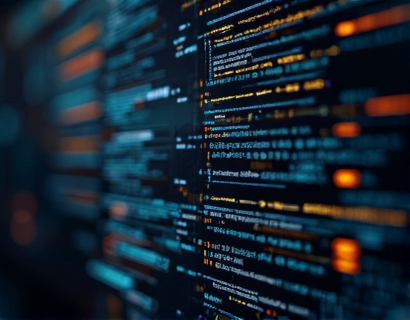AI-Powered Task Management: Master Personal Productivity with Intelligent Organizational Tools
In the fast-paced modern world, managing tasks efficiently and maintaining personal productivity have become paramount. The integration of Artificial Intelligence (AI) into task management tools offers a revolutionary approach to organizing daily activities, enhancing focus, and achieving goals. This article delves into how advanced intelligent tools can transform personal organization and productivity, providing practical insights and strategies to leverage AI for greater efficiency and goal achievement.
Understanding AI-Powered Task Management
AI-powered task management tools are designed to automate and optimize the way individuals handle their tasks and schedules. These tools use machine learning algorithms to understand user behavior, predict task priorities, and suggest optimal workflows. By analyzing patterns and preferences, AI can provide personalized recommendations that adapt to the user's evolving needs.
The core functionality of AI task management tools includes task creation, scheduling, reminders, and progress tracking. However, the true power lies in their ability to learn from user interactions and improve over time. For instance, an AI tool can recognize that a user consistently procrastinates on certain types of tasks and proactively suggest breaking them down into smaller, manageable steps.
Enhancing Focus and Reducing Distractions
One of the most significant benefits of AI-powered task management is its ability to enhance focus and reduce distractions. Traditional task lists can be overwhelming, leading to decision fatigue and decreased productivity. AI tools simplify this by prioritizing tasks based on urgency and importance, ensuring that users concentrate on the most critical activities first.
These tools can also implement the Pomodoro Technique, a time management method that breaks work into intervals typically 25 minutes long, separated by short breaks. By integrating such techniques, AI can help users maintain a steady flow of work without burnout. Additionally, AI can detect when a user is distracted or off-task and gently nudge them back to their primary objectives.
Streamlining Daily Routines
AI-powered task management tools can significantly streamline daily routines by automating repetitive tasks and providing smart suggestions. For example, an AI tool can analyze a user's calendar and suggest the best times for meetings based on availability and historical productivity data. It can also recommend optimal times for focused work, considering factors like energy levels and environmental conditions.
Another practical application is the integration with smart home devices. AI can coordinate with these devices to create an environment conducive to productivity. For instance, it can adjust lighting, temperature, and even play specific music to enhance focus and comfort.
Personalized Goal Setting and Achievement
Setting and achieving goals is a crucial aspect of personal productivity. AI-powered tools offer sophisticated goal-setting features that go beyond simple to-do lists. These tools can help users define SMART (Specific, Measurable, Achievable, Relevant, Time-bound) goals and break them down into actionable steps. AI algorithms can track progress, provide feedback, and adjust goals as needed to ensure continuous alignment with the user's objectives.
Moreover, AI can identify potential roadblocks and suggest strategies to overcome them. For example, if a user frequently fails to meet a particular deadline, the AI might recommend time-blocking that task or delegating parts of it to others. This proactive approach helps users stay on track and maintain momentum towards their goals.
Integration with Other Productivity Tools
The true power of AI-powered task management tools is their ability to integrate seamlessly with other productivity applications. This integration creates a cohesive ecosystem where data flows smoothly between different tools, enhancing overall efficiency. For instance, an AI task manager can sync with calendar apps, email clients, and project management software to provide a unified view of tasks and deadlines.
This interconnectedness ensures that users do not miss important updates or deadlines. AI can also analyze data from multiple sources to offer comprehensive insights and recommendations. For example, it can identify patterns in task completion times across different projects, helping users optimize their workflows.
Building Habits and Consistency
Consistency is key to long-term productivity, and AI-powered tools can play a significant role in building and maintaining good habits. By tracking user behavior and identifying patterns, AI can suggest tailored strategies to foster positive habits and break negative ones. For instance, if a user consistently checks emails during designated work hours, the AI can propose a "focus mode" that blocks email notifications during those times.
Additionally, AI can celebrate small victories and provide motivational messages to keep users engaged and motivated. This positive reinforcement helps in building a consistent work ethic and a growth mindset.
Overcoming Procrastination and Boosting Motivation
Procrastination is a common hurdle in personal productivity, but AI-powered tools can help overcome this challenge. By understanding the underlying reasons for procrastination, AI can offer customized solutions. For example, if a user tends to procrastinate on complex tasks, the AI might suggest using the "Eat the Frog" technique, which involves tackling the most daunting task first thing in the morning.
AI can also use gamification elements to boost motivation. By turning tasks into games with rewards and achievements, AI tools can make the process of completing tasks more enjoyable and engaging. This approach leverages the psychological principles of intrinsic and extrinsic motivation, making it easier for users to stay on track.
Data-Driven Insights and Analytics
One of the most powerful features of AI-powered task management tools is their ability to provide data-driven insights and analytics. These insights can help users understand their productivity patterns, identify bottlenecks, and make informed decisions to improve their work processes. For instance, AI can generate reports showing the most productive times of the day, the types of tasks that take the longest to complete, and areas where the user excels or struggles.
These analytics can be used to refine workflows, set realistic goals, and allocate resources more effectively. Users can also share these insights with colleagues or managers to demonstrate their productivity and collaborate more efficiently.
Challenges and Considerations
While AI-powered task management tools offer numerous benefits, there are also challenges and considerations to keep in mind. One major concern is data privacy and security. Users must ensure that the tools they use comply with data protection regulations and implement robust security measures to safeguard sensitive information.
Another consideration is the potential for over-reliance on AI. While these tools can greatly enhance productivity, it's essential to maintain a balance and not let technology dictate every aspect of task management. Users should use AI as a supportive tool rather than a replacement for their own judgment and decision-making skills.
Conclusion
AI-powered task management tools represent a significant leap forward in personal productivity and organization. By leveraging advanced algorithms and machine learning, these tools can simplify tasks, enhance focus, and streamline daily routines. They offer personalized solutions that adapt to individual needs, helping users achieve their goals more efficiently and effectively.
As AI technology continues to evolve, the potential for even more innovative and intuitive tools is vast. By embracing these advancements, individuals can transform their approach to productivity, leading to a more structured, fulfilling, and successful life.











































